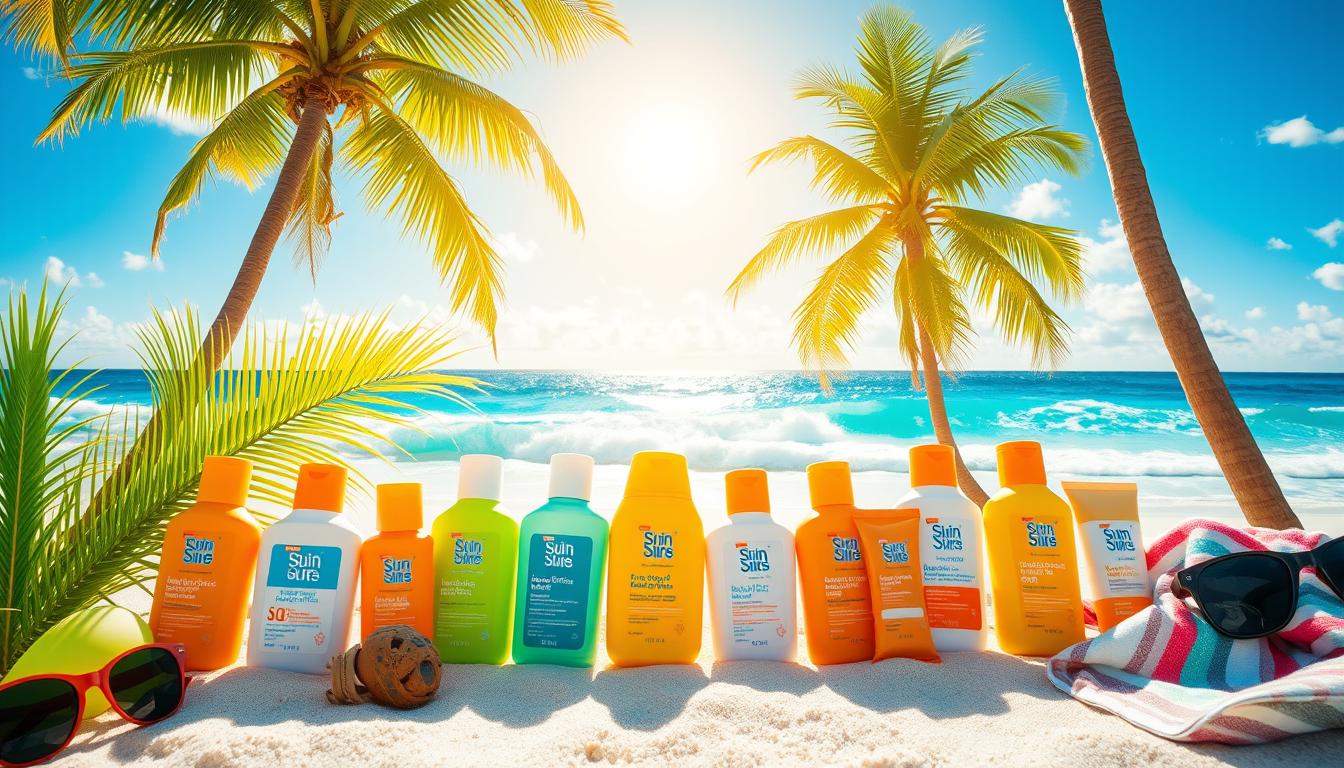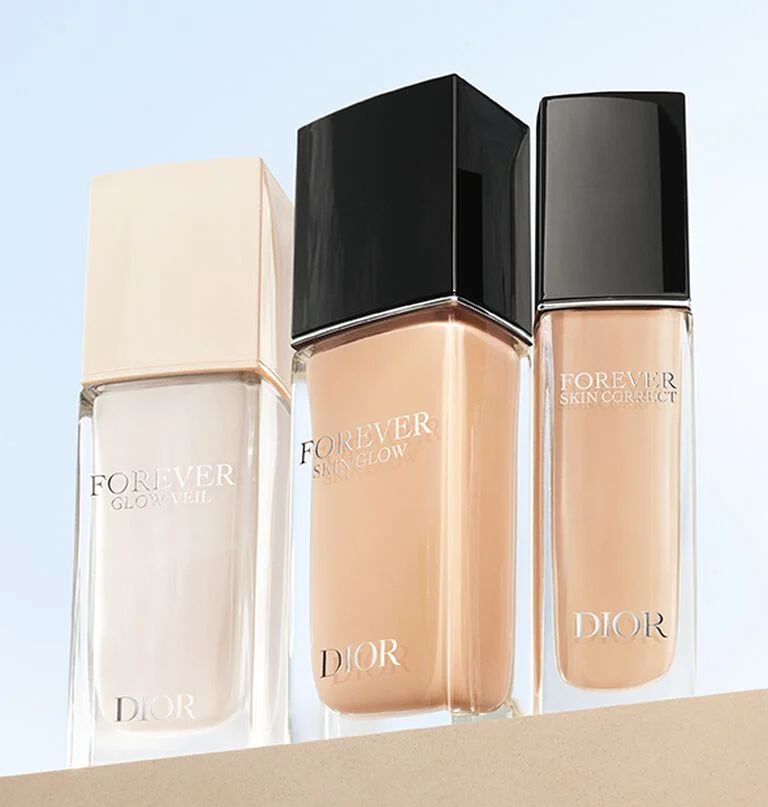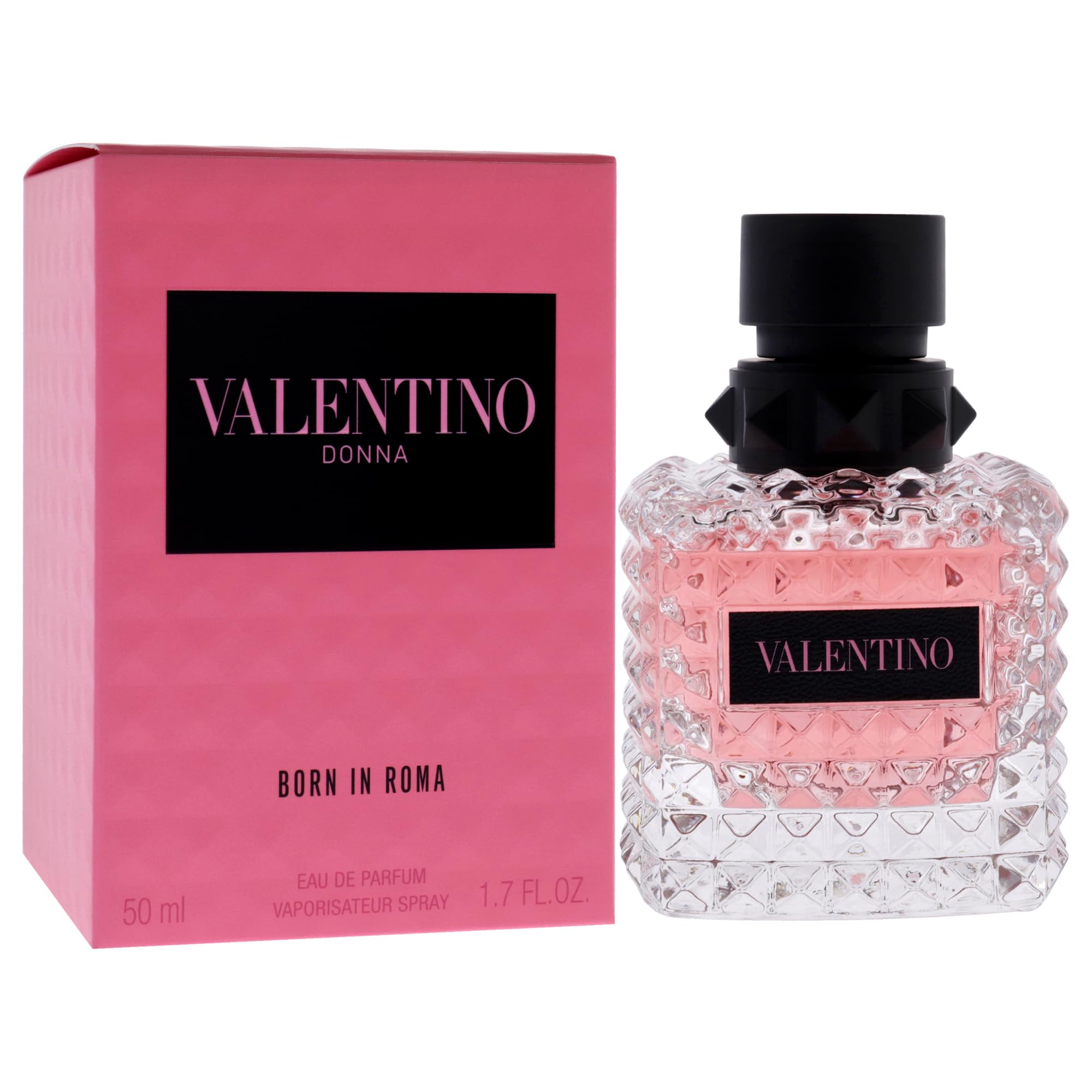Protect Your Skin: Choose the Right Sunscreen
Did you know a single bad sunburn can double your risk of melanoma, the deadliest skin cancer? It’s clear that picking the right sunscreen is key to protecting your skin from the sun’s UV rays. This article will help you find the best sunscreen for your skin and lifestyle. It will keep you safe and protected from the sun.
Key Takeaways
- Sunscreen is essential for protecting your skin from harmful UV radiation, which can lead to skin cancer and premature aging.
- Understanding SPF (Sun Protection Factor) and broad spectrum protection is crucial when selecting a sunscreen.
- Choosing the right sunscreen formula, whether mineral or chemical, is important for your skin type and needs.
- Water-resistant sunscreens are essential for active lifestyles and sweaty activities.
- Proper sunscreen application and reapplication are key to ensuring effective sun protection.
Understanding the Importance of Sunscreen
Sunscreen is key to protecting your skin from the sun’s harmful UV rays. These rays can cause sunburns and long-term skin damage. This includes premature aging and a higher risk of skin cancer, like melanoma.
Shielding Your Skin from Harmful UV Rays
UV radiation is a known carcinogen. It can damage skin cells’ DNA, leading to skin cancer. Sunscreen works as a shield, absorbing or reflecting these rays. This reduces your exposure and the chance of skin cell mutations.
The Role of Sunscreen in Preventing Skin Cancer
Using sunscreen regularly can lower your risk of melanoma by up to 50%. It also protects against other skin cancers, like basal cell carcinoma and squamous cell carcinoma.
Proper sun exposure and UV protection keep your skin healthy and young. Using a high-quality, broad-spectrum sunscreen is a simple way to protect your skin. It helps prevent photoaging and melanoma prevention.
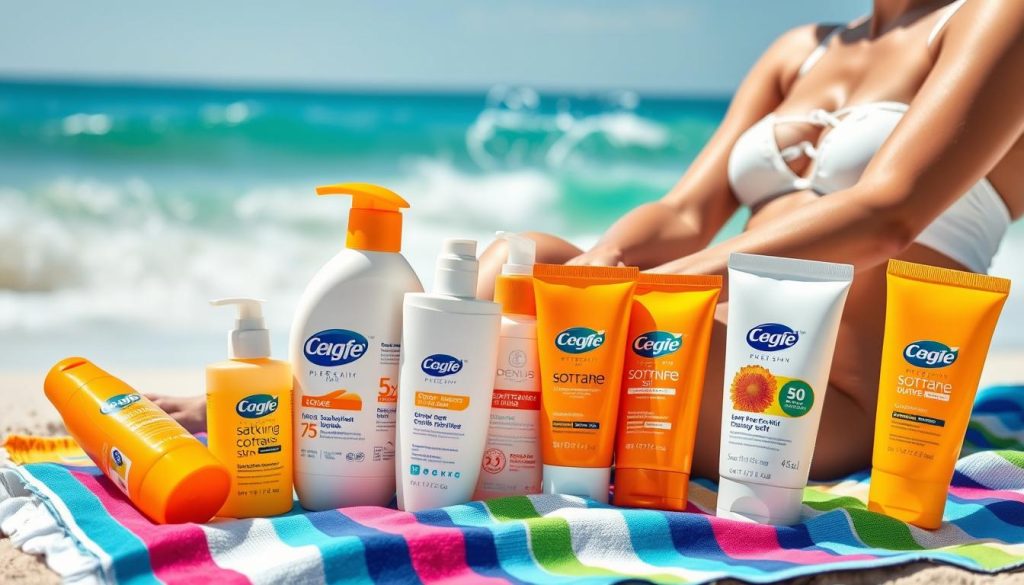
Decoding Sunscreen Labels
Understanding sunscreen labels can be tough, but it’s key to pick the right SPF for your skin. Let’s explore what SPF means and why broad-spectrum coverage is important.
SPF: What Does It Mean?
SPF stands for Sun Protection Factor. It shows how much UVB rays it takes to burn your skin compared to without sunscreen. A higher SPF means more UV protection from sunburns. For instance, SPF 30 means your skin will burn 30 times longer than without sunscreen.
Broad Spectrum Protection
SPF mainly protects against UVB rays. But, it’s also vital to find broad-spectrum sunscreen labels that block UVA rays too. UVA rays cause deep skin damage and can lead to skin cancer. Broad spectrum spf products protect against both UVB and UVA, giving you full sun protection.
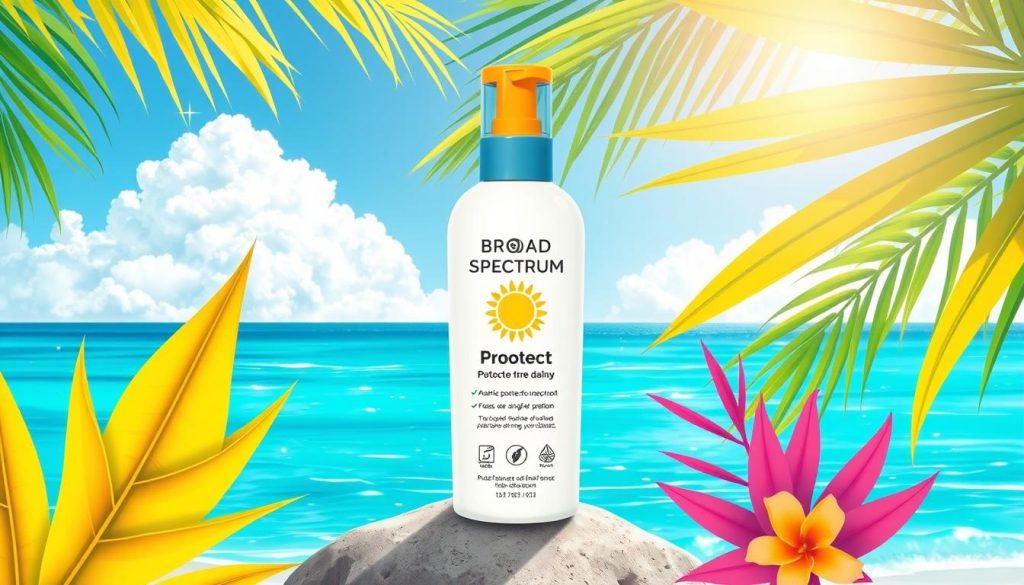
Knowing what sunscreen labels say helps you pick a safe and healthy sunscreen for sunny days.
Sunscreen: Essential for All Skin Types
Sunscreen is a must-have for everyone, no matter your skin type. It protects you from the sun’s harmful rays. Whether you have sensitive skin or want a sun-kissed look, the right sunscreen is key.
People with sensitive skin should choose sunscreens carefully. Mineral-based sunscreens are a good option. They use zinc oxide or titanium dioxide to block UV rays without irritating your skin.
If you want to keep your tan, try tinted sunscreen. It protects your skin and adds natural color. This way, you can enjoy your tan without losing sun protection.
| Skin Type | Sunscreen Recommendation |
|---|---|
| Sensitive Skin | Mineral-based sunscreens with gentle, non-irritating ingredients |
| Oily Skin | Oil-free, non-comedogenic sunscreens to avoid clogged pores |
| Desired Tan | Tinted sunscreens to maintain a healthy, sun-kissed glow |
It’s vital to pick a sunscreen that protects against broad-spectrum UVA and UVB rays. Look for an SPF of 30 or higher for the best protection.
“Sunscreen is the best anti-aging product you can use. It protects your skin from harmful UV rays that can cause premature aging, wrinkles, and even skin cancer.” – Dr. Jennifer Ashton, board-certified dermatologist
Choosing the right sunscreen is crucial for safe sun protection. It helps you maintain a healthy glow or enjoy a sun-kissed look.
Choosing the Right Sunscreen Formula
Choosing the right sunscreen is key. Different formulas meet different skin needs and preferences. The choice between mineral sunscreen and chemical sunscreen greatly affects how your skin reacts.
Mineral vs. Chemical Sunscreens
Mineral sunscreens, or physical sunscreens, use zinc oxide or titanium dioxide. They reflect and scatter UV rays. This makes them a good choice for sensitive skin, as they are less irritating.
Chemical sunscreens, on the other hand, use synthetic ingredients that absorb UV radiation. They are lighter and more appealing for some skin types.
| Mineral | Chemical |
|---|---|
| Reflects and scatters UV rays | Absorbs UV radiation |
| Often preferred for sensitive skin | Lighter and more cosmetically appealing for some |
| Uses zinc oxide or titanium dioxide | Contains synthetic active ingredients |
When picking between mineral and chemical sunscreens, think about your skin type and what you like. Try out different sunscreen formulas to find the best one for you.
Water-Resistant Sunscreens for Active Lifestyles
If you’re always on the move, finding the right sunscreen is key. Water-resistant sunscreens are made for those who love the outdoors. They work well when you’re swimming, playing sports, or doing anything else that gets you wet or sweaty.
These sunscreens stick to your skin, even when it’s wet or sweaty. This keeps your skin safe from ultraviolet (UV) rays. Whether you’re at the beach, hiking, or playing your favorite outdoor activities, your skin is protected.
Benefits of Water-Resistant Sunblock
- Maintain protection during sweat-inducing activities
- Provide long-lasting coverage even when swimming or engaging in water sports
- Offer reliable sun protection for an active lifestyle
- Help prevent sunburns and reduce the risk of skin damage
When picking a water-resistant sunscreen, look for labels that say “water-resistant” or “sweat-proof.” These formulas stay on your skin, keeping you protected from the sun, even when you’re wet or sweaty.
| Product | Water-Resistance | SPF | Key Features |
|---|---|---|---|
| Neutrogena Waterproof Sunscreen | 80 minutes | 50+ | Broad spectrum, oil-free, non-comedogenic |
| Coppertone Sport Sunscreen | 80 minutes | 30 | Sweat-proof, tear-free, PABA-free |
| La Roche-Posay Anthelios Sunscreen | 80 minutes | 60 | Mineral-based, water-resistant, fragrance-free |
Choosing a good water-resistant sunscreen lets you enjoy the outdoors without worry. Your skin stays safe from the sun’s harmful rays, even when you’re sweating or in the water.
Sun Protection for Sensitive Skin
Finding the right sunscreen for sensitive skin can be tough. Harsh chemicals and strong fragrances can cause irritation and allergic reactions. Luckily, there are sunscreens made just for sensitive skin that protect without harming.
Hypoallergenic and Fragrance-Free Options
When picking a sunscreen for sensitive skin, look for “hypoallergenic” and “fragrance-free” labels. These sunscreens are made to avoid allergic reactions and irritation. They skip harsh ingredients like synthetic fragrances and preservatives, making them gentler for sensitive skin.
Mineral-based sunscreens are great for sensitive skin. They use zinc oxide and titanium dioxide, which sit on the skin’s surface. This way, they block UV rays without being absorbed into the skin, reducing irritation.
- Look for sensitive skin, hypoallergenic, and fragrance-free labels when choosing a sunscreen.
- Opt for mineral sunscreens containing zinc oxide or titanium dioxide for a gentler formula.
“Protecting your skin from harmful UV rays is essential, but it’s equally important to choose a sunscreen that won’t aggravate sensitive skin conditions.”
Choosing the right hypoallergenic and fragrance-free sunscreen is key for sensitive skin. It lets you enjoy sun protection without worrying about bad reactions. Going for gentle, mineral-based sunscreens can really help keep your skin healthy and comfortable.
Applying Sunscreen Correctly
To keep your skin safe from harmful UV rays, applying sunscreen right is key. It’s a crucial part of your skincare routine.
Start with the right amount. Dermatologists say to use about 1 ounce, or a shot glass full, for your whole body. Make sure to cover all exposed areas, like your face, neck, and ears.
- Apply sunscreen 15-30 minutes before going outside. This lets it soak into your skin.
- Reapply every 2 hours, or more if you’ve been swimming or sweating.
- Don’t forget spots like your lips, around your eyes, and the tops of your feet.
How well you apply sunscreen affects its protection. Spread it on thick and evenly for the best sun protection.
| Sunscreen Application Tips | Benefits |
|---|---|
| Use a generous amount (1 ounce per application) | Ensures adequate UV exposure coverage |
| Reapply every 2 hours, or more often if swimming/sweating | Maintains continuous skin care routine protection |
| Apply to all exposed skin, including often-missed areas | Provides comprehensive sunscreen application |
“Proper sunscreen application is the key to effective sun protection. Don’t skimp on the amount – use a generous layer for best results.”
Sun Safety Beyond Sunscreen
Sunscreen is key for sun protection, but it’s not everything. To stay safe, you should also wear protective clothing and seek shade.
Protective Clothing and Shade
Wearing the right clothes can change your sun safety game. Choose lightweight, tight fabrics that block UV rays. Look for long-sleeved shirts, pants, and wide-brimmed hats. Make sure they have a high Ultraviolet Protection Factor (UPF).
Also, finding shade is a big help. When you can, take a break from the sun. Look for a spot under a tree, umbrella, or canopy. This can greatly reduce your sun exposure and lower sunburn and skin damage risks.
| Sun Safety Measure | Benefits |
|---|---|
| Protective Clothing | – Blocks UV rays – Covers more skin area – Provides a physical barrier against sun exposure |
| Seeking Shade | – Reduces direct sun exposure – Lowers risk of sunburn and skin damage – Offers a convenient break from the sun |
Using sunblock, wearing protective clothing, and seeking shade together make a strong sun safety plan. This protects your skin and keeps you healthy. Sun protection is about using many strategies. The more you use, the safer you’ll be.
The Importance of Reapplying
Reapplying is crucial for sun protection all day. Sunscreen’s power to block UV exposure fades over time. This is especially true after swimming, sweating, or drying off with a towel.
To keep your skincare effective, reapply sunblock every 2 hours. Do this more often if you’re in the water or outside. Reapplying keeps your skin safe from the sun’s harmful rays.
Sunblock isn’t just for once. You need to apply it often to protect your skin. Even on cloudy days, the sun’s rays can harm you. Always check and reapply sunblock as needed.
“Proper and consistent sunscreen reapplication is one of the most effective ways to protect your skin from the harmful effects of UV exposure.”
- Reapply sunscreen every 2 hours, or more frequently if swimming, sweating, or towel drying
- Reapplication helps replenish the active ingredients and maintain continuous sun protection
- Don’t forget to reapply on cloudy days – UV rays can still penetrate through the clouds
Make sunscreen reapplication a daily habit. This way, your skin stays protected from the sun’s harm. It lowers your risk of sunburn, early aging, and skin cancer. Don’t skip this important step for full sun protection.
Conclusion
Choosing the right sunscreen is key to good skin care and sun safety. Knowing what to look for helps protect your skin from UV rays. This way, you can enjoy the outdoors without worry.
Whether you like mineral or chemical sunscreens, or need something for sensitive skin, the right one matters. Always apply and reapply sunscreen for the best sun protection.
But sunscreen isn’t the only thing. Wearing protective clothes and staying in the shade also helps. A complete approach keeps your skin safe and healthy, so you can have fun outside.

